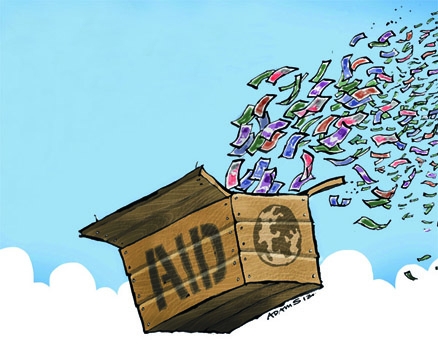‘Why did you leave us?’ said the old Sudanese man in Omdurman market. ‘Things were so much better when you were here.’ He was talking about the British empire, of course, and apologies if I’ve told the story before, as I know I have. It’s just that it’s such a fantastically satisfying way of winding up all those guilt-ridden post-colonial types who find it a source of shame and embarrassment that the world’s atlas was once half-covered pink.
I don’t though. Not at all. What shames me far more are the mistakes we’re now making as a response to that guilt. We’re still treating the Africans like children; and we’re still ripping them off. But where before we at least gave them a functioning administration and justice system and a passable transport infrastructure, now all we’re offering them is a bunch of Ruperts with Soas degrees in sustainability, zooming around in Land Cruisers in search of hot French doctors from Médicins San Frontières to shag, while helping the local economy barely one jot.
There are now 100,000 aid workers in sub-Saharan Africa. As Jonathan Foreman notes in his superb Civitas pamphlet Aiding and Abetting, this ‘greatly exceeds the number of foreign administrators engaged by the former colonial powers at the height of the imperial era.’ And to what end? Since 1960, western governments have pumped more than $1 trillion in aid into the region, with the remarkable result that GDP per capita has declined.
A few months back, Foreman and I appeared at the Durham University Union, proposing the motion ‘This house would put Britain before Bangladesh’. We lost, as I knew we would. (Because I’d already lost debating a similar motion at Oxford last year.) You can lay out the evidence as clearly as you like: that aid props up corrupt politicians; filches the best local talent; kills entrepreneurship; misdirects resources. But no audience — least of all a bunch of right-on undergraduates with their frontal lobes as yet unformed — is going to be seduced by such unpalatably brutal truths. Far better to succumb to your feelings, and what your feelings say is: ‘Aid must be right because it’s caring; and caring is nice!’
The Chinese and the Saudis, the West’s two main neo-imperial rivals in the region, are far more clear-headed and ruthless about the purpose of their African presence. For the Saudis, it’s religious imperialism: they build mosques and medical centres and in return get converts to Wahhabism. For the Chinese, it’s economic imperialism: they build the infrastructure; in return they get the mining rights — and woe betide any locals that stand in their way: they just get shot, as happened to 11 workers in Zambia four years ago.
Could we do something similar, only more sympathetically? Of course we could. But look at what happens when we try. You’ll no doubt have seen the story a few months ago about a FTSE 250 company called Soco exploring for oil in the Democratic Republic of Congo. It ought, by rights, to have been presented as a great British success story: UK firm brings much-needed revenue to a basket-case economy ravaged by civil war.
Instead, what we got was a horror yarn about rapacious Big Oil violating ‘Africa’s oldest national park’, the Virunga, and threatening the mountain gorillas made famous by David Attenborough. Never mind that the designated drilling area was nearly a hundred miles from the nearest gorilla — the WWF-sponsored campaign got into all the newspapers, a) because it enabled them to run free gorilla photos and b) because it was fronted by the actress Anna Friel, photographed in Uganda looking caringly across the border through a pair of binoculars.
At the height of the campaign, I met Soco’s American-born CEO, Roger Cagle, who was in despair. Nothing in his past — not even a stint with the US Marine Corps in Vietnam — had prepared him for the horror of dealing with a green NGO. He’d tried presenting the facts as he saw them, but the WWF just weren’t interested. ‘They told me that that campaign was the most successful fundraiser in their history, so they weren’t in any mood to climb down.’ Nor did they. Humiliatingly, Soco decided to bow out by signing an agreement promising not to drill for oil in the area. Leaving the door wide open, presumably, for the lovely, nurturing, eco-friendly Chinese to move in instead.
What I found particularly depressing about the episode wasn’t so much the WWF’s behaviour — just greenies doing what greenies do — as the way the political and media establishment ganged up to join them. The newspapers ran the WWF’s propaganda virtually straight off the press release; their City pages couldn’t get enough of those sexy Anna Friel photos; the trendy Frontline Club screened a documentary ‘proving’ how totally evil Soco were; even the Foreign Office joined in to say the drilling didn’t have its support.
And I’m sure everyone involved felt as good and fluffy inside as they do when they donate to Oxfam or when David Cameron ringfences 0.7 per cent of our GDP for vital projects like building wind farms in Uganda. But I wonder if there isn’t something grotesquely self-indulgent about this kind of moral grandstanding — especially given that it does so remarkably little for those Africans it’s supposed to be helping.
Nor for us. Last week, the Mail ran a big story on the appalling plight of the tens of thousands of Africans who flee the continent every year in their hideously overcrowded boats. We think of it as an immigration problem. But for them, it’s an economic problem. An economic problem which we in the West — despite all our good intentions — have done much to help create.







Comments